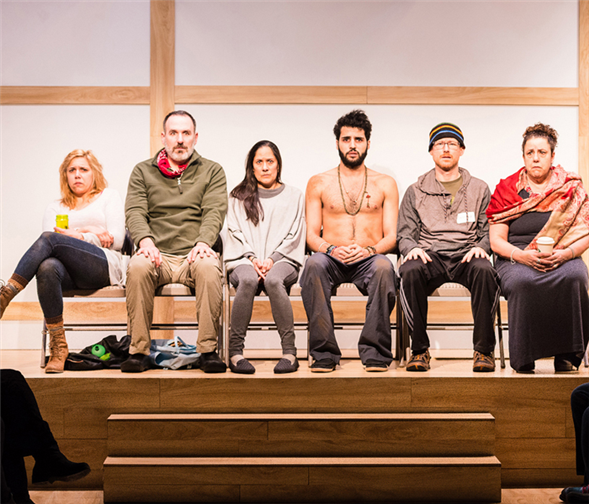The fascinating silence of Small Mouth Sounds
---
When she signed up for a wellness retreat in upstate New York a few years back, playwright Bess Wohl had no idea she was laying the groundwork for a future play.
She also had no idea that the program required a vow of silence.
"That was news to me when I got there," Wohl says. "I was with one of my best girlfriends. There was a teacher there we both loved, and we had to read a lot of this teacher's books. And of course my writer brain started cooking: 'This would be such a great environment for a play!' As soon as I got there, I was both participant and observer, the way writers often are."
Small Mouth Sounds, now having its premiere at Off-Broadway's Ars Nova, is directly inspired by the sound of silence that Wohl experienced on that visit -- and others -- to a verdant campus devoted to mind, body and spirit.
In scenic designer Laura Jellinek's 90-seat "Japanese/Danish Modern/Minimalist" runway-style space, Wohl's six student characters, like many who populate spiritual oases, have gathered to "alleviate the basic difficulty of living in the world," the playwright says.
"What's necessary for any play is that all the characters really
need something," she continues. "This is a place where there is this automatic need."
Their unseen Buddhist-leaning guru, whose accent is billed in the script as "somewhere between affected and foreign," is heard on a God mic, sharing mystical allegories, playing music on his recorder, and occasionally making lip-smacking noises that inspire the play's title.
"I always wanted to watch the students
listening," Wohl says of the Teacher, played by absent actor Jojo Gonzalez.
"I felt if you put the teacher on stage, people would watch the Teacher, and the students would become — like the audience — sort of inert. Keeping the Teacher offstage, it took on all this resonance for me of the Voice of God — present but just out of reach, and a little bit hard to understand."
The mystery of character extends to the students. Only one has a name, and since talking is kept to a minimum, it's up to the audience to decipher backgrounds, relationships, hopes, passions, and pains.
"Even in my plays that have a lot of speaking in them, the audience seems to love to decode things for themselves," says Wohl, whose
American Hero played Off Broadway last summer. "You'll hear one lady whisper to another: 'That's her brother!' or 'She's not gonna like that!' They like to be detectives as they watch a play. I thought it would fun to lean into that impulse, give them an opportunity to be detectives even more."
Inspired by the scenario rather than strict dialogue, the director, designers, and cast became sort of "co-authors," Wohl says. Under the direction of Rachel Chavkin, who shaped and edited the action, actors were encouraged in rehearsal to improvise behavior based on stage directions in the lean script, which runs only 42 pages. "Character" was further inked in by costume designer Tilly Grimes; those messy oversize sweaters on actress Jessica Almasy, for instance, indicate the sloppy inner chaos of her student.
There were three distinct versions of
Small Mouth Sounds in its developmental steps, which included nurturing in Ars Nova's Play Group. The first pass had a lot of talking, which seemed to betray the silent-retreat premise; the second approach had zero talking, which felt like a "gimmick," the writer says; and the current take allows a minimum of talking to seep in.
Wohl asked herself: "What are the moments in this play when somebody would be moved to say something? There
are situations when you would break the rule of silence if things get heated enough. I wanted to be careful about not overplaying those. When people need to break the rule, I let them."
Like a student making a cathartic breakthrough, Wohl feels that she grew muscle as a dramatist in the writing process.
"I was really sick of the way I was writing," she says. "I have this almost pathological need to be entertaining and keep the pace up and keep the jokes coming." With the new play, "I was trying to teach myself the same thing that the characters are learning: How to stay and sit and be patient and allow things to happen rather than forcing them to happen."
She confesses, "I'm curious now to go back to writing plays where people talk to each other."
---
Kenneth Jones is a theatre journalist and dramatist. He also writes at ByKennethJones.com and elsewhere.
Photos by Ben Arons
